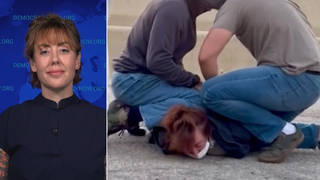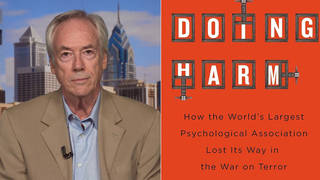
Guests
- Stephen Xenakisa psychiatrist and retired brigadier general who has advised the chairman of the Joint Chiefs of Staff on military mental health issues. He is founder and president of the Center for Translational Medicine. He was part of the task force that authored the new report, “Ethics Abandoned: Medical Professionalism and Detainee Abuse in the 'War on Terror.'”
- Leonard Rubensteina senior scholar at the Center for Human Rights and Public Health at the Johns Hopkins Bloomberg School of Public Health. He is the lead author of the report, “Ethics Abandoned: Medical Professionalism and Detainee Abuse in the 'War on Terror.'”
Links
- Read: Ethics Abandoned: Medical Professionalism and Detainee Abuse in the 'War on Terror.'"
- Read: Letter From Doctors Calling on President Obama to End Force-Feeding and Restore Medical Ethics at Guantánamo
- Center For Translational Medicine
- Center for Human Rights and Public Health
- Physicians For Human Rights
- Commission on Accountability
A new report says medical professionals working under U.S. military orders have been complicit in the abuse of terrorism suspects. The Task Force on Preserving Medical Professionalism concluded that medical staff who worked with the CIA and Pentagon “designed and participated in cruel, inhumane and degrading treatment and torture of detainees” at Guantánamo Bay and at secret prisons overseas. The two-year study cites doctors for breaching patient confidentiality and advising interrogators on how to exploit prisoners’ fears and crush their will to resist. The task force is calling for a full investigation of the medical profession’s role in U.S. torture and an overhaul to ensure doctors involved in interrogations follow ethical standards. Both the CIA and the Pentagon have rejected the report’s findings. We are joined by two guests: retired brigadier general Dr. Stephen Xenakis, a military psychiatrist who advised the chair of the Joint Chiefs of Staff on military mental health issues, and Leonard Rubenstein, senior scholar at the Johns Hopkins Bloomberg School of Public Health and co-author of the report, “Ethics Abandoned: Medical Professionalism and Detainee Abuse in the 'War on Terror.'”
Transcript
JUAN GONZÁLEZ: We turn now to a new report that says medical professionals working under U.S. military orders have been complicit in the abuse of terrorism suspects. An independent panel found that U.S. military doctors have violated medical ethics by enabling the torture of prisoners in the so-called war on terror.
The Task Force on Preserving Medical Professionalism concluded that medical staff who worked with the CIA and Pentagon, quote, “designed and participated in cruel, inhumane and degrading treatment and torture of detainees” at Guantánamo Bay and at secret prisons overseas. The two-year study cites doctors for breaching patient confidentiality and advising interrogators on how to exploit prisoners’ fears and crush their will to resist. According to the report, the Department of Defense came up with euphemisms to excuse violations of ethical standards. For example, they referred to health professionals engaged in interrogation as, quote, “safety officers.” The group also found that the CIA’s Office of Medical Services played a critical role in reviewing and approving forms of torture, including waterboarding.
The task force consists of 19 experts from the fields of military, health, law and human rights. They are calling for a full investigation of the medical profession’s role in U.S. torture and an overhaul to ensure doctors involved in interrogations follow ethical standards. Both the CIA and the Pentagon have rejected the report’s findings.
AMY GOODMAN: For more, we go to Washington, D.C., where we’re joined by Leonard Rubenstein, the lead author of the report. It’s called “Ethics Abandoned: Medical Professionalism and Detainee Abuse in the 'War on Terror.'” He’s senior scholar at the Center for Human Rights and Public Health at Johns Hopkins Bloomberg School of Public Health.
And in Jacksonville, Florida, we’re joined by Dr. Stephen Xenakis, a psychiatrist and retired brigadier general who was a member of the Task Force on Preserving Medical Professionalism in National Security Detention Centers that issued the report. Dr. Xenakis has advised the chair of the Joint Chiefs of Staff on military mental health issues and is the founder and president of the Center for Translational Medicine, which assists in testing and treatment of soldiers and veterans of the Iraq and Afghanistan wars.
Dr. Xenakis and Leonard Rubenstein, we welcome you to Democracy Now! Leonard Rubenstein, as lead author of the report, lay out your major findings.
LEONARD RUBENSTEIN: The most important finding was these aspects of complicity in torture and detainee abuse were actually generated and directed by the Pentagon and the CIA. And those rules are still in effect.
Basically what happened was that the two agencies took professional standards—basically, the professional obligation not to harm people—and changed it, and it substituted its own standards, which are in conflict with all professional obligations. And as a result of that, doctors and psychologists were told that what they were doing was ethical and legitimate. And so, that legacy remains. And that, I think, is one of the principal issues in this report.
As recently as 2012, the Pentagon issued rules concerning the roles of health professionals in interrogation, which continued to ask that they or require that they exploit—identify and exploit detainee vulnerabilities. And just this year, the Pentagon issued even more draconian rules on force-feeding hunger strikers, which are even more punitive than the past. So, this legacy is still with us, and I think the task force and professional organizations want a restoration of ethical and professional values that have been the hallmark of military medicine.
JUAN GONZÁLEZ: And, Dr. Xenakis, you served during the Vietnam War. Could you talk about what you’ve seen in terms of the change of the relationship, how the military deals under the war on terrorism with using medical professionals? And did you find individuals in your report who actually objected to what they were being asked to do?
DR. STEPHEN XENAKIS: Well, the most important is that, in this war, that since 2001, that military physicians have been used as combatants, so that they’ve been used in ways other than healthcare providers and clinicians. And that’s a real significant break. That has not been part of military medicine. It’s not in our tradition. And in fact, during the Vietnam era, it was expected, and the soldiers really respected us and wanted to know that we, as their doctors who would be in the field, would stay in that very special position. And they could come to us with confidence that we would always be concerned about their health and welfare, and we could make autonomous decisions. So this is a really big break. And it hasn’t happened before, and it’s a serious breach, as far as I’m concerned. There were—
AMY GOODMAN: You served at Guantánamo, Dr. Xenakis. Tell us what you saw there, what that break was.
DR. STEPHEN XENAKIS: Well, I see the doctors really having to subordinate themselves to the command, and that they don’t have autonomy. They can’t exercise their best judgment when it comes to the diagnosis and treatment of the detainees there. They’re limited. They’re really constrained in terms of how they can go into the backgrounds and the histories. They might uncover things that these people were subjected to abuse, like the piece that you’ve just done right before here. And all this is kept from them, and they’re not able to do what I think is their best clinical practice.
JUAN GONZÁLEZ: And could you give some examples of what were some of the unethical medical practices that clinicians were asked to do?
DR. STEPHEN XENAKIS: Well, I mean, as Mr. Rubenstein has said, they were early involved in the Behavioral Science Consultation Teams, or called the BSCTs. So these were specially configured teams that were going to advise the interrogators. And they were specifically giving the interrogators information on the health condition of the subjects, on vulnerabilities, on ideas about what their psychology was, so that they could be exploited. And they were going to be exploited to exercise stress and coercion, with the idea that they were going to get better information. Well, that’s totally outside the domain of what we do as doctors. I mean, we don’t get information to use it in a way that’s going to directly harm the patient or the subject here.
Today, of course, it’s most vividly occurring with the hunger strikes, so that these detainees who find themselves in a situation of indefinite detention, feeling much despair about their situation, disillusioned about what’s happened, really want to be able to express nonviolently their feelings about it. And the command there is subjecting them forcibly to force—to force-feeding—that is, the nasogastric tubes and the nutrition that comes with that—and the doctors are complicit with that. And that violates our medical ethics. I mean, they don’t want that. I mean, one of our principles is that we respect the autonomy of our patients. We work with them. We establish a good patient-doctor relationship. And in that sense, we do what we think is in their benefit and what they want. So, it’s really, unfortunately, a continuing problem.
AMY GOODMAN: CIA public affairs chief Dean Boyd said the report, quote, “contains serious inaccuracies and erroneous conclusions.” He also said, quote, “It’s important to underscore that the CIA does not have any detainees in its custody and President Obama terminated the Rendition, Detention and Interrogation Program by executive order in 2009.”
The Pentagon also responded. Spokesperson Todd Breasseale told reporters that none of the critics of prisoner care, quote, “have had actual access to the detainees, their medical records,” or the procedures at the Guantánamo detention camp. According to the Pentagon spokesperson, Guantánamo’s doctors and nurses are, quote, “consummate professionals working under terrifically stressful conditions, far from home and their families, and with patients who have been extraordinarily violent.” He said the doctors and nurses, quote, “routinely provide not only better medical care than any of these detainees have ever known, but care on par with the very best of the global medical profession.”
Leonard Bernstein—Leonard Rubenstein, your response?
LEONARD RUBENSTEIN: Well, there are certainly health professionals there who are doing their best under stressful situations. I think we have to look not at the doctors alone; we have to look at the policy. For example, the CIA says it’s—our conclusions are erroneous. Well, our investigation was based on CIA documents. For example, the Office of Medical Services said that waterboarding is medically acceptable. It said, in writing, that sleep deprivation for over a week was medically acceptable. So, we’re basing it on their—on their own documents. And they have not told us one fact that we’ve gotten wrong.
With respect to the Pentagon, there, too, we’re basing our information on their policies. I cited two of them. And what’s also important to know is for about eight years I have been requesting the Pentagon access to detainees, to look at the detainees’ medical records, have confidentiality agreements, security agreements. That has always been turned down. And that’s why one of our most important conclusions is to call for a full investigation. We don’t claim to know everything. But we have a lot of information from their own policies, and no one has ever told us that those policies are not in effect. So I think this is a lot of denial without any basis. And I don’t think we should be fooled that these kinds of blanket statements have any basis. They can look at our report for the citations.
JUAN GONZÁLEZ: And, Leonard Rubenstein, is there any potential here for medical personnel who went along with—with these activities, especially when they did it abroad in other countries, to be subject to complaints to their professional ethics boards here in the U.S.?
LEONARD RUBENSTEIN: There should be. In fact, about a half a dozen complaints have been filed in different states. Unfortunately, the state medical boards, which have jurisdiction over licensing and discipline of physicians and psychologists, have not acted on any of these complaints. I think they’ve ducked them for a variety of reasons. And they’ve dismissed them mostly on jurisdictional or procedural grounds, haven’t explained why they’ve dismissed them.
So, apart from everything else, we need a more robust and more courageous disciplinary system and reform at the state level. And there have been efforts in that respect in New York state, and we’d like to see the medical community get behind it. There has been some leadership in the medical community. Just this week, 40 very prominent doctors, including a former surgeon general under the Bush administration, wrote a letter to the administration saying, “You’ve got to end force-feeding. It violates all our professional standards and puts doctors in a terrible position.”
AMY GOODMAN: Wrote that letter to the Obama administration?
LEONARD RUBENSTEIN: They wrote to the president, yes. It was a couple of days ago, after our report came out.
AMY GOODMAN: Dr. Stephen Xenakis, do you think doctors at Guantánamo and other such places who engaged in torture of prisoners, or somehow in their abuse, should be brought up on charges?
DR. STEPHEN XENAKIS: I don’t want to take it out on the people on the front lines. This was a problem with the leadership. These were the policies and practices these people were ordered to do, what they—to be involved in these interrogations and other activities. It started with the secretary of defense, said, “We’re going to take the gloves off.” It started with a statement that the Geneva Conventions were not going to apply to these men. And it should be focused onto the leadership. These are young professionals who are trying to do their best and balance what they know is the essence of their medical ethics and their profession with an interest in protecting our country. And so, I would want to avoid doing that. But I do think we should hold the senior leadership accountable, because they’ve set the whole stage here.
And I would really disagree with the statement from the Department of Defense, which—that these people are still dangerous, that they’ve always been dangerous. We had 850 different detainees since 2002 down there. There are 164 now. There are a group that are going to be brought up on charges. There’s a group that can’t be brought on charges because of history, that in fact are really confirmed and would engage in attacking the United States. But most of these people are just from these villages. They’re just—they were caught up in this thing. Some of them were sold for bounties. And they just want to go home. And this is not a criminal population. And I think that it’s a real mischaracterization of them and really unfair.
AMY GOODMAN: I want to thank you both for being with us, Dr. Stephen Xenakis, psychiatrist and retired brigadier general who was a member of the Task Force on Preserving Medical Professionalism in National Security Detention Centers, and Leonard Rubenstein, the lead author on the report, “Ethics Abandoned,” now at Johns Hopkins University’s Bloomberg School of Public Health. We will link to the report, “Ethics Abandoned: Medical Professionalism and Detainee Abuse in the 'War on Terror,'” at democracynow.org.












Media Options